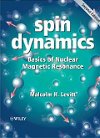From The DNP-NMR Blog:
[NMR] Permanent position for a researcher - staff scientist at CEA Grenoble in DNP-enhanced solid-state NMR #DNPNMR
Permanent position opening for a researcher - staff scientist at CEA Grenoble In the field of DNP-enhanced solid-state NMR
Job description
The Interdisciplinary Research Institute of Grenoble (IRIG) has an open position for a researcher - staff scientist specialist in NMR spectroscopy applied to the chemical sciences. The successful candidate will be affiliated to the Modeling and Exploration of Materials Laboratory (MEM), a joint research unit of CEA and the University Grenoble Alpes. He/she will join the DNP research group led by G. De Paëpe at the IRIG, CEA Grenoble, France.
The successful candidate will participate in the research activities of the group, will build and manage new projects with academic and industrial partners. He/She will also be in charge of the DNP-NMR lab equipment in terms of day-to-day operation, maintenance, hardware troubleshooting and fixing. As such, duties include operation of 2 high-field DNP-NMR spectrometers, a fully automated cryostat for close-loop cryogenic helium sample spinning, developing and testing helium/nitrogen fast MAS DNP probes. A central aspect of the work will consist in setting up established pulse sequences (for spin ˝ and quadrupolar nuclei) but also to design and develop innovative sequences, data acquisition and processing protocols, as well as user-friendly post-processing analysis tools. The position implies as well, taking an active part in training and guiding graduate students from the group.
Scientific environment and workplace
<div style="text-align: justify;">The MEM laboratory currently hosts 2 DNP spectrometers, including the first DNP spectrometer installed in France (2011). Since then, the laboratory has gained international recognition in the DNP field. The originality of the Grenoble DNP team lies in the diversity of its research, which encompasses methodological developments (pulse sequences, sample preparation, DNP theory, design of improved polarizing agents, targeted and selective DNP), major instrumental developments (autonomous helium cryostat and fast MAS cryogenic probes operating at very low temperatures



